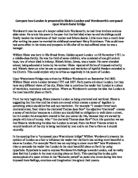In the fourth line of ‘Composed upon Westminster Bridge’, Wordsworth writes: “The city now doth like garment wear”. This seems like he is saying that the garment can be taken off and show a horrible side of London when the time comes. It is strange to think that London’s beauty is represented by a garment. If Blake had written that London is like a garment, he would say that London wears a black cloak to represent the misery and woe he sees through the ‘chartered’ streets.
A Petrachen Sonnet is usually used as a love poem. ‘Composed upon Westminster Bridge’ is a sonnet, this expresses the beauty and possibly his love for the city. Wordsworth, however, grew up in the countryside (Lake District) and based many of his earlier poems on the country around him. This love for the city may be the love for the opposite lifestyles. The use of a sonnet for Wordsworth’s poem is a stark contrast to Blake’s. He used no such structure, as his poem is looking at London as a dark and unromantic place.
Wordsworth’s intended audience was probably the people living in London at that time or he may have been hinting at people outside of London to visit. It is very unlikely that Blake did not intend to have the same audience as Wordsworth, as the people living in London would not like to hear words like “appalls” (sic), “woe” and “cry” in a poem about the city they live in. I, however, agree with both of these poems. It is true; in the early hours of the morning in the nineteenth century that London would probably look beautiful, being able to see the fields surrounding the city and the sky free of smoke: “All bright and glittering in the smokeless air”. But, as Blake writes of London being terrible and ‘chartered’, he is also right. In the late hours of the night, it is possible for the image of nineteenth century London to become unpleasant and blighting as night draws in.
Wordsworth seems to be calm and composed as he watches London from Westminster Bridge, whereas Blake seems edgy and deprived of a happy life in London. It is possible that before they wrote the two poems, they could have had something happen to them to change their mood of London. Wordsworth for example could have fallen in love and written a poem from where he was sitting, thinking of the contrasting beauty of his love and the city. Blake however, could have had a bad thing happen to him, changing his opinion of the city he is in.
London is a man-made place, with evidence all around: “Ships, towers, domes, theatres and temples lie” (Wordsworth) and Blake mentions church and palace walls. This is contrasted by the natural beauty of London: “Open to the fields and to the sky” (Wordsworth) and “Near where the chartered Thames does flow” (Blake). Blake also says “mind forg’d manacles” which gives the impression that the public were controlled – most probably by the government. This links to the French Revolution here, because the peasants overthrew the government in France and this suggests that it could happen in Great Britain.
Blake sees London through the emotions of the people around him and writes of their sorrow and harrowing experiences: “And the hapless soldier’s sigh”. The only mention of people in ‘Composed upon Westminster Bridge’ is: “Dull would he be of soul who could pass by”.
Wordsworth uses many different ways to express his feelings – for example, Wordsworth uses personification: “Houses seem asleep!” and syntax: “Ne’er saw I” instead of “I ne’er saw”. Blake doesn’t use personification, similes or oxymoron in his poem of London.
As I have indicated, Blake’s ‘London’ and Wordsworth’s ‘Composed upon Westminster Bridge’ are almost totally the opposite: Blake’s view through the poem is personal, ‘unromantic’ and depressing. Wordsworth’s view however is beautiful, romantic and cheerful.
Wordsworth was influenced by Jean Jacques Rousseau’s profound love of nature and there are many examples of this in ‘Composed upon Westminster Bridge’.







